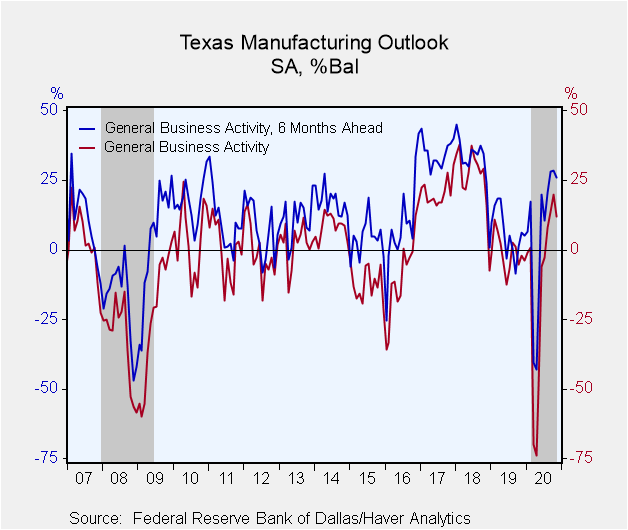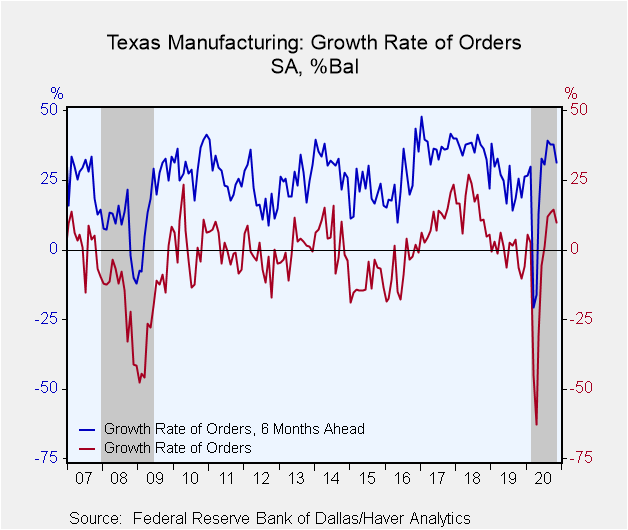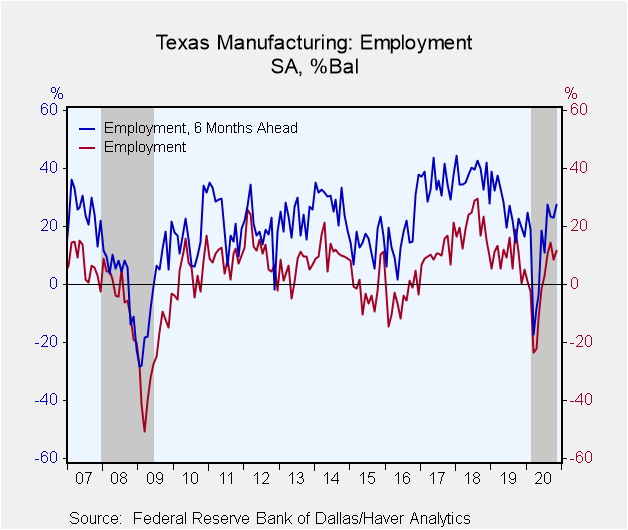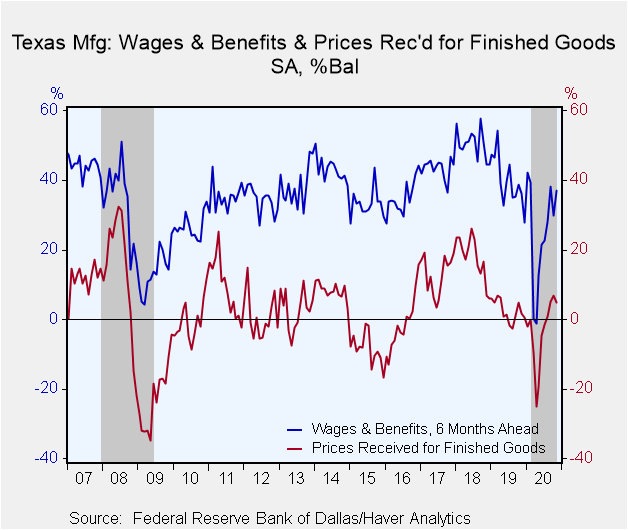 Global| Nov 30 2020
Global| Nov 30 2020Texas Factory Sector Outlook Index Declines in November
by:Tom Moeller
|in:Economy in Brief
Summary
• General business index slipped. • Production cratered but employment improved. • Expectations index eased. The Federal Reserve Bank of Dallas reported that its Texas Manufacturing Outlook Survey General Business Activity Index fell [...]
• General business index slipped.
• Production cratered but employment improved.
• Expectations index eased.
The Federal Reserve Bank of Dallas reported that its Texas Manufacturing Outlook Survey General Business Activity Index fell to 12.0 in November from 19.8 in October. Despite the decline, the index was positive for the fourth straight month.
The production measure fell sharply to 7.2 from 25.5 in October. It was the lowest reading of the economic recovery. The new orders growth measure weakened to 9.7 from the recovery high of 14.3 in October. The shipments measure also fell but unfilled orders rose.
The employment reading improved to 11.7 and recovered half of October's decline. Twenty-five percent of respondents reported increased hiring, a recovery high, while a slightly increased 13% indicated a decline. Wages & benefits also dipped, but remained well above the slightly negative figures at the end of the recession.
The prices received measure slipped to 4.7 but compared to the sharp deflation recorded six months earlier. Fourteen percent of respondents reported receiving higher prices while nine percent indicated a decline. The raw materials price measure surged to its highest level since October 2018.
Expectations for overall business activity ebbed. The measure weakened to 25.8, the lowest level in three months. The production and future new orders growth readings softened. The expected shipments held steady m/m but remained near the highest level since late-2018.
Future employment rose moderately from October and remained improved from a low six months earlier. Future wages were near the highest level of the economic recovery.
Each index is calculated by subtracting the percentage reporting a decrease from the percentage reporting an increase. When all firms report rising activity, an index will register 100. An index will register -100 when all firms report a decrease. An index will be zero when the number of firms reporting an increase or decrease is equal. Items October not add up to 100% because of rounding. Data for the Texas Manufacturing Outlook can be found in Haver's SURVEYS database.
| Texas Manufacturing Outlook Survey (SA, % Balance) | Nov | Oct | Sep | Nov '19 | 2019 | 2018 | 2017 |
|---|---|---|---|---|---|---|---|
| Current General Business Activity Index | 12.0 | 19.8 | 13.6 | -2.0 | -1.1 | 25.8 | 20.6 |
| Production | 7.2 | 25.5 | 22.3 | -2.5 | 8.9 | 21.4 | 20.2 |
| Growth Rate of New Orders | 9.7 | 14.3 | 13.2 | -10.3 | -1.1 | 14.8 | 11.4 |
| Employment | 11.7 | 8.7 | 14.5 | 0.4 | 9.5 | 20.0 | 11.4 |
| Wages & Benefits | 13.6 | 16.5 | 15.9 | 19.8 | 23.5 | 29.7 | 22.2 |
| Prices Received for Finished Goods | 4.7 | 6.8 | 5.2 | 1.6 | 2.5 | 17.6 | 12.7 |
| General Business Activity Index Expected in Six Months | 25.8 | 28.4 | 28.0 | 6.2 | 6.4 | 31.6 | 34.6 |
| Production | 40.8 | 47.2 | 47.8 | 30.9 | 35.6 | 48.6 | 46.9 |
| Growth Rate of New Orders | 31.3 | 37.9 | 37.6 | 18.9 | 25.2 | 35.8 | 37.7 |
| Employment | 27.5 | 23.1 | 23.3 | 19.8 | 26.1 | 37.7 | 35.3 |
| Wages & Benefits | 37.0 | 29.9 | 38.1 | 36.2 | 39.7 | 50.4 | 43.4 |
Tom Moeller
AuthorMore in Author Profile »Prior to joining Haver Analytics in 2000, Mr. Moeller worked as the Economist at Chancellor Capital Management from 1985 to 1999. There, he developed comprehensive economic forecasts and interpreted economic data for equity and fixed income portfolio managers. Also at Chancellor, Mr. Moeller worked as an equity analyst and was responsible for researching and rating companies in the economically sensitive automobile and housing industries for investment in Chancellor’s equity portfolio. Prior to joining Chancellor, Mr. Moeller was an Economist at Citibank from 1979 to 1984. He also analyzed pricing behavior in the metals industry for the Council on Wage and Price Stability in Washington, D.C. In 1999, Mr. Moeller received the award for most accurate forecast from the Forecasters' Club of New York. From 1990 to 1992 he was President of the New York Association for Business Economists. Mr. Moeller earned an M.B.A. in Finance from Fordham University, where he graduated in 1987. He holds a Bachelor of Arts in Economics from George Washington University.










